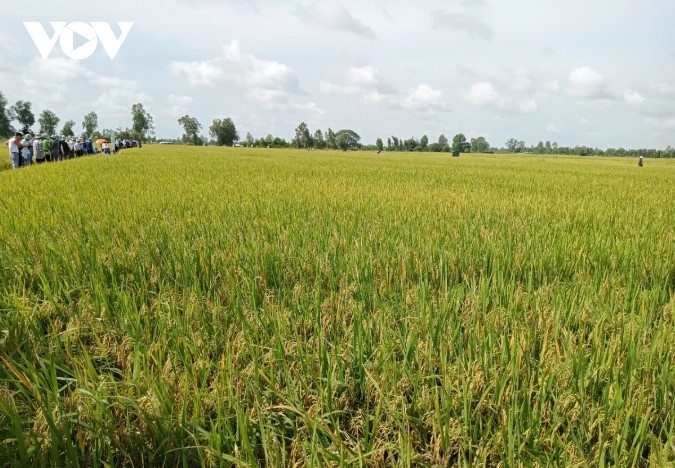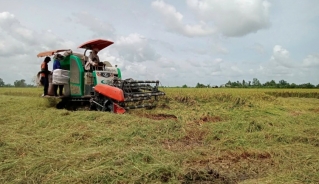Japan's role in driving digital and green transformation in Mekong Delta
VOV.VN - As a key partner of Vietnam in agriculture, particularly in digital transformation and high-tech applications, Japan plays a crucial role in attracting enterprises specializing in digital technology, mechanization, and sustainable agricultural startups.

According to the Department of Crop Production under the Ministry of Agriculture and Rural Development, the project "Sustainable Development of One Million Hectares of High-Quality, Low-Emission Rice Associated with Green Growth in the Mekong Delta region by 2030" is being implemented in 12 provinces and cities across the region.
Before expanding the project, the ministry piloted seven models in five localities. Results showed that this model helps reduce seeding rates, fertilizer, and pesticides while improving rice yield and quality. Additionally, farmers' incomes increased, and greenhouse gas emissions were significantly reduced.
Le Thanh Tung, Vice Chairman and Secretary General of the Vietnam Rice Industry Association, stated that the project plays a crucial role in rice production by ensuring national food security and fostering sustainable, climate-resilient agricultural development in the Mekong Delta region while improving farmers' incomes.
According to Tung, the project's goal is to restructure rice production along the value chain, enhance added value, and apply sustainable farming practices that adapt to climate change and reduce greenhouse gas emissions. This effort aligns with Vietnam’s international commitments.
The project will also upgrade infrastructure, improve logistics and innovation centers, and refine technical packages based on the "one must, five reductions" method. Moreover, it will support the reorganization of smallholder farmers through agricultural cooperatives and farmer organizations.
Furthermore, the project aims to provide training and technology transfer to farmers on sustainable farming practices, farm management, and digital applications in areas such as monitoring, reporting, and carbon credit verification. Financial and technical resources will be mobilized domestically and internationally, including results-based climate financing (RBCF), to support low-carbon rice production and implement the MRV (measurement, reporting, and verification) system for carbon credit issuance.
Tung also noted that the project seeks to develop a market for low-carbon rice by building branding and expanding market access for this product from the Mekong Delta and Vietnam as a whole. Additionally, it will strengthen the domestic ecosystem supporting the transition to high-quality, low-carbon rice production, including access to finance, results-based carbon payment mechanisms, and benefit-sharing models.
"With the implementation of the one-million-hectare rice project, we can reduce seed use by 50 %, nitrogen fertilizer by 30%, and pesticides by 30% while minimizing lodging, post-harvest losses, and average carbon emissions by 5 to 6 tons per hectare per crop. At the same time, profits can increase by VND5 million per hectare. This demonstrates that we fully meet the technical, technological, and commercial criteria of the project while enhancing linkages between enterprises and cooperatives," Tung stressed.

According to the Department of Cooperative Economy under the Ministry of Agriculture and Rural Development, there is substantial demand for investment and technological applications in digital and green transformation. Cooperatives play a vital role in uniting farmers, organizing production, and marketing rice. To establish a transparent and efficient agricultural value chain and promote branding, enterprises and cooperatives must collaborate closely to form a sustainable value chain.
Technology must ensure high-quality rice production, emission reduction, and environmental protection. Key technologies include monitoring and assessing flooding conditions and seeding feasibility, water management, sowing techniques, product consumption, pest control, and traceability.
Le Duc Thinh, Director of the Department of Cooperative Economy and Rural Development, said that the demand for digital applications in cooperatives is substantial, with approximately 2 million farming households, 1,230 cooperatives, and 210 rice enterprises involved. Digital solutions such as electronic logs, traceability systems, and water management assessments will be deployed.
Japan is a key partner of Vietnam in agriculture, particularly in digital transformation and high-tech applications, making it essential to attract Japanese enterprises specializing in digital technology, mechanization, and sustainable agricultural startups.
“We are particularly interested in Japanese enterprises in digital technology, mechanization, and sustainable agricultural startups,” Thinh emphasized.
The Mekong Delta plays a key role in national food security and global rice exports. However, the region faces multiple challenges, including climate change, resource degradation, rising production costs, and increasingly stringent international market requirements regarding quality, traceability, and carbon emission reduction.
Deputy Minister of Agriculture and Rural Development Tran Thanh Nam stated that to promote agricultural transformation in the Mekong Delta region through digital and green technology adoption, enhancing productivity, quality, and emission reduction, the ministry is actively carrying out the project and seeking cooperation with international organizations, particularly Japanese investors, to provide technological solutions and training support.




